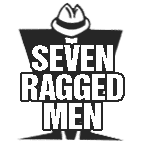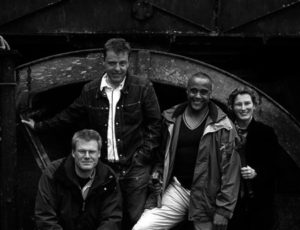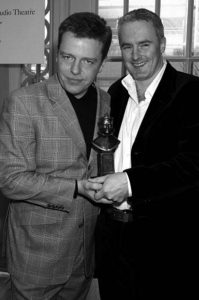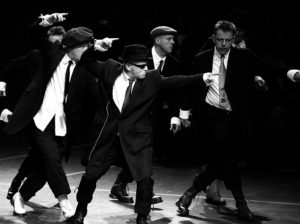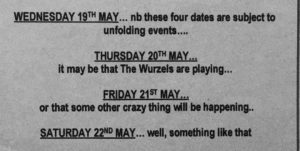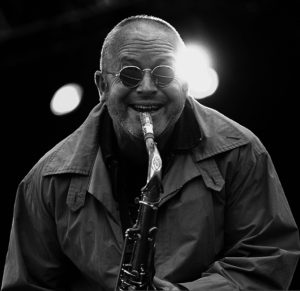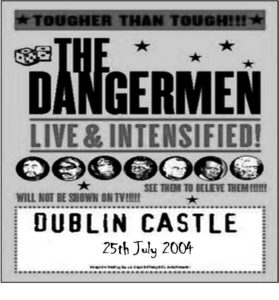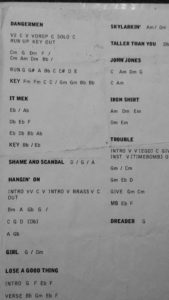
2003-2004
Gigs continue to combine fans of all ages, and the band themselves look to the past for their next project.
2003
CHRIS (speaking in 2003): The people who come to see us vary in age, from the first time fans to their children, or indeed grandchildren, and also some that were only three years old the first time round.
JANUARY 1: It's the Number One Party, BBC1
JANUARY: Suggs starts presenting Salvage Squad
SUGGS (speaking in 2003): I’m at a point in my life where things interest me beyond guitars and leather trousers. I fixed a couple of scooters when I was 16, but my role in Salvage Squad is to be a non-expert. I’m supposed to be the conduit between the experts, talking about fangle wangles, and I’m just the average person asking them what it all means. It’s illuminating to see people dedicated to pure expertise – it was inspiring going to the finest spring manufacturers in the world in Wolverhampton. I’m building up to a cathartic experience. I bought an allotment two years ago and I’m getting broody for a new purpose in life. I want a shed, with a few tools, a paraffin lamp and an armchair.
JANUARY 27: Carl is a guest on music quiz show Never Mind The Buzzcocks
FEBRUARY 14: Our House wins Best New Musical Award at the Olivier Awards
SUGGS (speaking in 2003): I’m absolutely overwhelmed. Your mind is just filled with clichés. You understand why people like Gwyneth Paltrow burst into tears and all that. I would never have imagined 20 years ago when we were sat around writing those songs in a smelly rehearsal room in Camden Town that one day, not only would we be in a theatre in the West End, but that I would get an Olivier Award. I think there’s been a certain snobbery about taking songs that are already successful and making it into popular theatre. And I think getting this today proves that it doesn’t mean the work isn’t sophisticated, or entertaining or theatrical.
TIM FIRTH (writer): My most pungent memories of the band during the show’s life were not to do with script but rather Carl giving me a kung fu massage on the floor of the stalls bar, Mike giving me a lesson in playing Our House on the piano, and Suggs giving me a Chinese burn on the left arm when it was announced we’d won the Olivier.
FEBRUARY 17: Appear on The Kumars at No42
MARCH: Suggs announces he’s to star in Our House, replacing Ian Reddington as Joe Casey’s dad
SUGGS (speaking in 2003): I’ve been very involved since the beginning, spending a lot of time at the show. I’ve always loved what Ian has done with the role, and he’s always joked with me that it could have been written for me. That started me thinking each time I sat through the show, ‘What would it be like in the part?’ So I finally thought I would give it a go. Roll on next year’s Oliviers! It’s a different discipline, but I’m going in with the full idea of thoroughly enjoying myself.
MARCH 14: Madness appear on Ant & Dec’s Show
MARCH 17: Suggs does one-week stint in Our House
SUGGS (speaking in 2003): The discipline of being in a band and being in a musical is very different. The discipline of being in a band is arguing about what trousers you’re going to wear, smoking a few fags, then going on stage. The discipline of being in a musical is rehearsing for months on end, twisting your ankle and being told you still have to go on stage anyway. And every afternoon being re-directed by the director over the slightest mistake you made the night before. It’s a constant reach for perfection every night and a very interesting discipline, and within that you have to keep the joy and feeling of the whole thing. Also, being in the musical means I don’t get out of the theatre ’til after 11, so you have a bit to eat and your lifestyle starts swinging round into later nights and getting up later. I sleep well – I can sleep for days. Luckily I’m one of those people who can snooze. Healthy, in terms of heart attacks. I’ve got all the other things wrong though.
MARCH: Suggs returns in I Think I’ve Got A Problem
MARCH: Lee returns from house-swap in Australia
MARCH 29: Charity gig, Royal Albert Hall, London
CARL (speaking in 2003): I’m pleased Lee came back as, personally, I hate performing or promoting with stand-ins. Apart from being a bit weird for the fans, it wears a bit thin – I like to take Madness seriously.
APRIL 7: Suggs starts five-week stint in Our House
SUGGS (speaking in 2003): It’s really hard work, and it’s night after night, after night. And you don’t have any nights off. You know, some nights I’d be behind the curtain waiting for my entrance, and I couldn’t remember if I’d done the scene and was I coming on at the end, or I was coming on again, am I getting my applause now, or is it the beginning? And you sit in this little room on your own and you have to have the show coming out of this tiny little speaker so you get your cue, and it’s a very lonely and rather repetitive experience. And of course, every single day somebody would ring you up and go, ‘Are you going round to Fred’s?’ Of course, you can’t can you? ‘Are you going to that party?’ Of course, you can’t. So your social life slowly withers and dies, and people stop ringing you all together.
MAY 3: Suggs appears on Jools Holland’s Spring Hootenanny
MAY: Suggs’s run in Our House comes to an end
SUGGS (speaking in 2003): It’s been a very interesting process, a very terrifying experience and a very humbling experience. It was also very strange, because I played the part of the dad of the main character who’s actually a ghost. So it was very bizarre, because there I was, looking at all these kids doing our songs, actually being the dad of the songs, in inverted commas. I sang some of the songs. It was a very strange experience. I really took my hat off to those kids. You see those films like Fame and it all looks like a laugh, and there are those high leg kicks and everyone’s loving it, but it’s blummin’ hard work.
JUNE 5: Suggs, Lee and Chris appear at Tower Records, Piccadilly Circus, to sign fan merchandise
JUNE 28: Suggs appears with Jools Holland at the Glastonbury Festival, singing Oranges and Lemons Again.
JUNE 29: Corporate gig at Alton Towers for British Telecom
CHRIS: It was like being in a Madness covers band who were playing at the wedding of two sprightly 60-year-olds. My whole life flashed before me as my honourable esteemed and illustrious career flushed down the pan. I don’t ever want to do anything like that again.
JULY 4: Museumsplatz, Bonn, Germany
JULY 5: Guilfest, Guildford, Surrey
AUGUST 16: The Our House musical closes
PETER BENNETT-JONES (Tiger Aspect, speaking in 2003): The decision was taken with a heavy heart. It’s a terrific show, which well deserved its prestigious Olivier award and continues to generate a great response from audiences. But these are difficult times, politically and economically, and we’re among the casualties.
CHRIS: It just couldn’t compete with the big guns like We Will Rock You.
SUGGS: It was a hit, but we spent too much on the sodding production. And there’s nothing more cheery than passing the Queen musical and seeing it on for its 12th fucking successful year.
TIM FIRTH: Ninety per cent of the cast were in their late teens/early twenties, so it spoke directly to people of that age. Unfortunately, those aren’t the people who buy tickets to expensive West End musicals.
CHRIS: It was funny, but after it closed it went on to be really popular in amateur productions; people wanted to put it on all the time.
TIM FIRTH: It’s telling that when the rights were released to amateurs, the take- up was the greatest the publishers had ever known – almost entirely by schools and youth theatres.
WOODY: My wife still takes the piss about it. Whenever the musical’s mentioned at home she breaks into, ‘My girl’s mad at meeeeeeee!’
Woody begins teaching music technology and media arts at Hayes School, Kent. He works at the school until 2007
SEPTEMBER 7: Corporate appearance for Mastercard
SUGGS: They offer you more money for a night’s work than you normally earn in a year. It’s strange – you’re so used to touring when you’re a kid to make a living. But these companies are like the Emperors of old, finding musicians from the four corners of Europe to perform for them. Even if you have a few quid, it’s always good to have a few more.
SEPTEMBER 9: Woody plays with Madness tribute band Los Palmas 6 at a holiday camp in Selsey, Sussex
STEVE TURNER (Los Palmas 6): I’d made a mistake and allowed our drummer to book his holiday on the wrong dates, leaving us without a drummer. Our usual deputy was on tour, then I remembered when I played in Guilford with Madness that Woody had asked to play with us whenever we needed him. So I phoned him and he agreed. The day arrived and we met him in Selsey. On showing him a set list he told us that he hadn’t played Mummy’s Boy, In The Middle Of The Night or Believe Me for years, and he’d never played Cardiac Arrest live, so we had a long sound check. It was a great gig, albeit probably smaller than Woody is used to. He was excellent and a few Madness fans in the crowd were obviously over the moon to see him there. Woody said that it was the first gig in ages that he was paid on the night – even though it was probably slightly less than he was used to.
OCTOBER: Lee stars as Fagin in an amateur production of Oliver! at the Bull Theatre, Barnet
OCTOBER 29: Suggs appear on the BBC 6 Music breakfast show with Phill Jupitus
CARL (speaking in 2003): We are at the moment demoing an album of covers.
LEE (speaking in 2003): In the words of our management team, ‘It’s a tribute album not a covers album.’ It does sound good though.
CARL (speaking in 2003): Who knows? If all goes well then we’ll all be up for a new album of originals. There’s still a lot to do at the moment, what with the tour at Christmas and the challenge of making this year’s bash a bit more interesting.
DECEMBER 6: The Point, Ireland
TERRY EDWARDS (sax and trumpet player): I mainly played trumpet, swapping to alto sax for two or three songs. I also played baritone sax on Wonderful World and soprano on Victoria Gardens. Steve mainly played baritone sax, but also played tenor.
STEVE TURNER (sax player, speaking in 2003): I first met Lee when he came and played with us at a Los Palmas 6 gig in Brighton. Then I met all the band at Guilfest and was asked to join the tour this year. I guess I’m just a lucky bastard. Playing in Los Palmas 6 is great fun but nothing I have done yet compares to an arena tour with the real thing. I pinch myself about once a day.
TERRY EDWARDS (speaking in 2003): About half of the musical decisions are already made, so if trumpet’s on the record I’ll play trumpet, like in Tomorrow’s (Just Another Day), March of the Gherkins etc. Lee is the main man, so the best thing to do is complement what he’s already doing – there’s no point in all three of us playing the same thing, so I played the higher parts and Steve played the lower ones. Some bits were arranged in rehearsal like the ‘festive’ bits in Prospects.
DECEMBER 8: Wembley Arena, London
STEVE TURNER: The best show for me had to be Wembley as until then I was a Wembley virgin. The chance to solo at one of the country’s most prestigious venues was an ambition achieved.
DECEMBER 9: Kentish Town Forum, London
SUGGS (speaking in 2003): I thought by the time you were 35 you would reach some sort of plateau of grown-upness. I half hoped it would all level off and get a bit boring. But it seems to me that life gets more and more bizarre and surreal. I am probably more confused than I was when I was 18 about what it all means.
DECEMBER 11: Hallam FM Arena, Sheffield
STEVE TURNER: I loved playing Johnny The Horse as it gave me a solo. I also really enjoyed March of the Gherkins and Victoria Gardens. Me, Lee and Terry also learnt Primrose Hill, Keep Moving and Hall of the Mountain King, but they weren’t used in the end as we already had a long set.
DECEMBER 13: Telewest Arena, Newcastle
DECEMBER 14: SECC, Glasgow
CHRIS (speaking in 2003): We’re far more successful now as a live band, as opposed to selling large quantities of albums in the ‘80s.
WOODY (speaking in 2003): I’ve been surprised, it’s only been recently over the years that I’ve not been with Madness, people who are younger than me who’ve been saying, ‘I grew up with Madness and as Madness changed, I did or as I changed you did.’ And I didn’t know that before, I always thought, naively, people only loved Madness for what they were. It’s only years later that you realise that those type of albums, the more mature album, are actually appreciated by people but they’ve sold much slower and been bought by a different type of audience.
DECEMBER 16: Brighton Centre, Brighton
DECEMBER 17: CIA, Cardiff
DECEMBER 18: NEC, Birmingham
TERRY EDWARDS: The whole tour was great. Dublin was excellent, and as I’d never played Wembley Arena before that was a bit special. I made the most mistakes in Birmingham, without Lee trying to put me off. The tour was very short, actually – only nine dates over 12 days – and I’m used to going away for four weeks at a time, so it was easy to enjoy.
DECEMBER: Carl hints at what will happen in 2004
CARL (speaking in December 2003): We’re currently demoing an album of covers. Hopefully next year will go something like this: Covers album released / songs tribute to our youth / 25th year of Madness / celebrate / everybody happy / pull original material from under seven respective beds / record new album / very proud and happy with result / who know what next?
2004
SUGGS (speaking at the start of 2004): The Christmas tour was really good fun and we did a little bit of recording last year but, as ever, the problem has always been getting us all in the same room together. But we really enjoyed working together last year, and we’re talking to some record companies at the moment about doing a new recording.
JANUARY 16: Woody appears on the Liz Kershaw show on BBC 6 Music
WOODY (speaking in 2004): We keep it fresh by taking long breaks. When you come back you enjoy it and remember why it’s good.
JANUARY 23: Appear at fashion show in Paris
MIKE (speaking in 2004): We love playing, we love performing and we love the life. I had a ten-year break when I was living in Holland and I didn’t play at all. I was very lucky that I didn’t have to work at all. It’s not all plain sailing when everything gets knocked from under your feet. When I started working again I found it’s what I loved doing; I do really love this and I love making music.
FEBRUARY 18: Suggs appears on The Steve Wright Show on Radio 2
SUGGS (speaking in 2004): No one actually talks to me, I just get this, ‘Oi, Suggsy!’ Which must be a demographic, ’cause it’s all of them. Anyone in a van spots me straight away and shouts, ‘Oi, Suggsy!’ It beats having to chat, and sign autographs.
APRIL 1: Suggs guests with Jools Holland at The Teenage Cancer Trust concert at The Royal Albert Hall
SUGGS (speaking in 2004): We still have a lot of fun. We just took some time out along the way to re-evaluate why we’re doing it.
APRIL 14: Suggs and Mike play Hammersmith Working Men’s Club
SUGGS (speaking in 2004): The digital age has really changed the way the music business works, but what hasn’t changed is the live experience and that’s what you get when you see Madness, that’s for sure. Playing live is as exciting as it’s ever been, and part of that secret is that we don’t play too often. We used to play for months and months and months on end, and I think that can kill your enthusiasm.
APRIL: Mysterious adverts appear in the Dublin Castle gig listings
MAY 11: The Dangermen gigs are announced
LEE: Our manager dragged us in and said, ‘Everyone’s doing covers albums – Robbie Williams, Paul McCartney – so why can’t you?’
WOODY: We wanted to do something that reflected our 25 years and go right back to our roots. It was a celebration of all the stuff we listened to when we first played all those years ago.
SUGGS: We’d had the idea for a number of years and thought a return to our musical roots would be a great way to get back into the swing of being a band again; to revive and rejuvenate the reason we made music in the first place.
MIKE: We had two ideas – one was to go back and do the original set that we used to do when we were kids starting a band. The other was to do a more ska and reggae thing, which is what we decided on in the end.
LEE: I didn’t think there was any harm in returning to the music we listened to initially. It’s not that we got tired of the usual style of Madness, but we found the idea of redoing reggae more exhilarating.
SUGGS: My idea was to get everybody up dancing like we used to at the Dublin Castle in Camden on a Friday night and then make an album.
CHRIS: Carl had suggested covering a song called song High Wire, which was the theme tune of the Danger Man TV series, so then we decided to take things one step further and call ourselves The Dangermen.
PETER RUDGE (manager): Lee had the Dangermen idea and they all bought into this defence mechanism, ‘Yeah! We’re going to do it as an alter ego’.
MIKE: It felt so different to anything we’d done before that it was almost inevitable that we’d take on a different persona for the project.
SUGGS: We thought it would be nice to do it under another name, so there wasn’t a huge expectation to hear all the Madness hits necessarily. Plus we didn’t have to worry too much because it was other people’s songs. So we could let off a bit of steam, keep our hands in and, at the same time, give our brains a rest.
WOODY: We thought doing a load of covers would make our lives easier. But when we started rehearsing we found that it wasn’t easy at all, because we had to bring some element of the band to it.
SUGGS: It went through about nine machinations. It was originally going to be our 1978 Invaders set with Downtown, For Once In My Life and Tears Of A Clown added. We did a few of those, but it just sounded like a disparate set of old Nuttiness.
WOODY: We decided we had to go out and play them live to get back to the roots of what we did; putting a mic on a piano and keeping it really simple.
CHRIS: To be honest I had reservations and wasn’t very keen on it from the start. It was alright, but I didn’t really want to do it. If it had been an original songs album I would definitely have had more interest, but the whole thing got on my nerves.
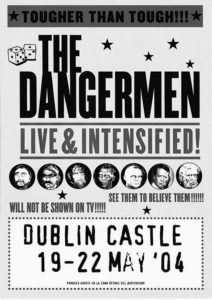
MAY 19: Play the first of four nights at the Dublin Castle as The Dangermen
MIKE: We really wanted to go back to the way of doing things like when we first started. So we didn’t have a record company and we did it all ourselves, with Mark designing the posters and Lee sticking them up everywhere.
SUGGS: It was enormous fun playing that great old dance music again in a sweaty pub, and boy was it sweaty. The perspiration was pouring off the ceiling. And even though it was a secret gig, the people were rammed to the rafters. The current owner, Henry, is the son of the original owner, when we first started out. I remember seeing his nose peeking over the bar when we first played there, and now it’s his belly. I said to him, ‘Is there any air conditioning?’ He said, ‘Air conditioning? I’ve turned the heating up. I’ll sell more beer.’ A chip off the old block.
WOODY: We went back to how we did things originally – going in to the studio and rehearsing, then getting a set and trying it out on an audience. We needed to experiment on live human beings; the songs that worked we kept, the ones that didn’t we dumped.
MAY 20-22: Play three more nights at the Dublin Castle as The Dangermen
SUGGS: It was a very exciting experience. Every night, we tried new arrangements, and then started to think of a list of songs that could be a good album. Everything started from there.
WOODY: It was amazing – although it was a bit cramped.
SUGGS: It was a bit like going back to your old school. It all seemed to have shrunk; all the chairs and the stools seemed to be half the size, and the room itself was certainly half its size.
CHRIS: Those gigs at the Dub were great, but I also felt they were a bit parochial. I wanted to do a tour of small places around the UK, blow the places apart, then record the album – but of course that idea got blown out of the water.
JUNE: Chris voices his reservations about The Dangermen – and Carl
CHRIS: We had a meeting and I said I would do the album, sign the deal, and so on, but only if Carl changed his behaviour towards our manager, which he said he would. But he didn’t. He was a problem indeed.
PETER RUDGE: Chris was agonising over whether he wanted to be involved. He couldn’t co-exist with Carl and thought the band was losing its raison d’être.
CHRIS: I’d never been keen to do an album of covers in the first place, as I felt it was too much like UB40. Suggs and Bedders persuaded me it would be tasteful and we did record some really interesting and unusual songs when we started, but they didn’t end up going anywhere.
PETER RUDGE: Others in the band were also uncomfortable with it – Mike in particular struggled intellectually and conceptually to understand why we were doing it. But at that time, there was no interest from anyone in a new Madness album and Madness, like any other band that’s had major success, were not cheap, so the return on investment was not healthy.
LEE: I was a bit against it at first, but we were at that age where you dry up in every department. Then I thought mebbe it would give a few quid back in royalties to the original artists who deserved it in the first place, which seemed to be a good enough reason.
MIKE: Different people in the band had different feelings about it, but with seven people in a band, there are always gonna be different opinions. Sometimes you just have to drag ’em along.
JUNE 5: Suggs starts a new Friday night show on Virgin Radio
SUGGS: I got a call asking if I’d like to host a Friday night show, like a big party. It was really good fun and it became the most popular show on the station. It was supposed to set off your Friday night, so there were lots of big party tunes. Bascially I’d just sit there with a few cans of beer, getting merrier as the evening went on.
JUNE 19: Corporate event for Vodafone
CHRIS: No bands like doing these sordid affairs. It’s just for the money, which wasn’t that much after tax. It’s hardly Sir Elton getting a million for playing for the Sheik of Araby or whatever.
JULY 2: Jaarbeurs, Utrecht, Netherlands
JULY 8: Move Festival, Lancashire County Cricket Ground, Manchester
SUGGS (speaking in 2004): We don’t do a lot of festivals and it’s always nice to play amongst your contemporaries to large enthusiastic crowds. The audiences are multifarious – sometimes we get oldies, sometimes we get youngsters. It depends on whether people are bringing their kids, I suppose. As a phenomenon, there aren’t many like us in terms of playing live and being entertaining to watch – there’s not much of that combination about at the moment.
JULY 25: Madness again play as The Dangermen at The Dublin Castle
SUGGS (speaking in 2004): We’ve now got a short little set of up-tempo ska songs that sounds really good and might be very close to being made into an album.
CARL (speaking in 2004): We intend to play a few more dates to really work out the material and introduce a few more songs into the set. It also gets across that we’re not playing our greatest hits set. I hope that we can make the hardcore fans happy and hopefully introduce some new people to what I honestly believe are one of the best live bands in the world at this time. I don’t want to sound too bigheaded, but I don’t think people realise how good a live act we are. Some of us have also begun work on writing the next original Madness material – but don’t hold your breath.
SEPTEMBER 24: Suggs performs at Koko, Camden
OCTOBER 8: Madness sign deal with V2 for new album
PETER RUDGE: V2 liked the covers album idea. They were entirely comfortable with it but maybe it was a tacit admission that they weren’t able to write new material that would resonate with the public any more. That felt a little like rolling over. We just thought the lesson of Wonderful was that new repertoire was not going to compete effectively. When you saw those live shows, ska hadn’t gone away. Madness were looking at those songs from the Trojan era and saying, ‘Why don’t we just take these and turn them into Madness-sounding tunes?’ just as they did originally with It Must Be Love or things of that nature.
TONY HARLOW (V2 CEO): We were interested in certain established artists who we felt were still making great music. I was an original Madness fan. I saw them at the Nashville back in the day when 2-Tone went off. We all got the short haircuts, Mr Byrite tonic trousers and a pair of Dr Martens.
DAVID STEELE (V2 MD): I was a huge fan of reggae and early ska, brought up on a staple diet of the originals which everyone in that 2-Tone era was doing. Peter Rudge approached me and said, ‘They’re thinking of doing an album of classic covers.’ I thought that was a great idea. They were talking to Universal but they came to us. So this was about finding the songs to cover and then finding the right people to record with. Lee was the true aficionado of all those old ska records. The inspiration definitely came from him. It was totally engrained in him. He was just infectious.
The band continue the selection process for the new album
DAVID STEELE: The band and myself made a long list because we wanted some well-known and some not so. We didn’t want to do a Labour Of Love, like UB40. It had to have proper ska, some great tunes. I loved that idea of them going back to their roots, playing small clubs and that excitement. These are people that you’re just proud to have on your label.
SUGGS: We really immersed ourselves in a lot of old ska and reggae again, which was really good fun. There were often songs you’d forgotten about until someone reminded you of another song that slowly led you there. So we’d spend afternoons listening to old records, which was really good fun.
CARL: Because Madness is a democracy, everyone had a choice. So we all picked two songs and played a few more live and then just whittled it down because we obviously couldn’t put everything all on one album.
WOODY: We tried different styles of music so it wasn’t just Blue Beat, ska and reggae – we tried everything.
SUGGS: We played maybe 30 or 40 tracks to boil it down to the final 13.
WOODY: The strange thing was, the process of elimination came down to what was really good fun and who danced to them, and we found that ironically it was the Blue Beat, ska and reggae tracks. It was a natural elimination.
SUGGS: The irony is that many of the songs had already been recorded in reggae form, such as You Keep Me Hanging On or even Lola. So even though they ended up a little Madness-ified, we based our version on the reggae cover version, not the original song itself.
MIKE: In the beginning it was hard to get the songs sounding really good, but then we kept working and they started taking on a life of their own. We were determined to play the music well and add something to the covers, there’s no point doing like George Michael did with Don’t Let The Sun Go Down On Me – it was hard to tell it apart from the Elton John version.
CHRIS: I think Mike chose Israelites, So Much Trouble In The World, Shame & Scandal, You Keep Me Hanging On and John Jones, Carl picked High Wire, Bedders went for Taller Than You Are, Suggs picked Girl, Chase The Devil and You’ll Lose A Good Thing and Lee plumped for Rain and Lola.
OCTOBER 13: Suggs completes his second, and final, series of Salvage Squad
SUGGS: It did seem a strange casting choice, with me standing in a field wielding a giant rusty spanner, enthusing about the restoration of a broken down combine harvester. I couldn’t even put up a shelf. But perversely, I started to enjoy it. I met some very interesting characters and went to a lot of interesting places.
Madness recruit new producer, Dennis Bovell
LEE: When we first went and worked on the songs they weren’t really going anywhere, but then Dennis got on board.
DENNIS BOVELL (producer): I went over to see them at the premises in Shoreditch where they were rehearsing. I forgot my earplugs and regretted it – they were so loud but also really good. I knew Woody was fantastic and wanted to get a really good drum sound for him.
CHRIS: We’d already recorded a lot of songs ourselves in small studios over a one-year period, so we then recorded a kind-of final 11 with Dennis, who was very good.
DENNIS BOVELL: They liked a brew. When they weren’t needed, they were in the pub. I had the number of the local landlord to say, ‘Can you send the lads over now?’ But as far as professionalism goes, they were a great bunch of lads. They definitely knew what they were doing. Suggs would steam into it. But I needed him to understand what I would class as good or not up-to-scratch and it’s unnerving to make a singer stop every time he makes a mistake. So I came up with the idea of, ‘You know what, do it again.’ ‘Waddaya mean, do it again?’ I’d just let him sing it five or six times then go through and get the best of every performance. Once I’d knitted them together and he heard himself, he could go out and do it all in one.
OCTOBER: Carl confirms a rumoured end-of-year tour won’t be happening
CARL (speaking in 2004): We’re busy rehearsing and working out what songs will be put on the album, which we consider a higher priority than touring. We’re excited about making this latest album and the recording of it has meant that we simply can’t fit a tour in as well.
OCTOBER: Disillusioned with The Dangermen project, and fed up of internal struggles, Chris secretly leaves the band
CHRIS: It just didn’t seem good enough for my band to be doing cover versions. Our body of work is too good for that. We started off doing really quirky stuff, and then one day we’re back doing Israelites which to me all seemed a bit desperate. A couple of the guys were also doing my head in a bit.
DENNIS BOVELL: There was definitely some internal squabbling between Carl and Chris. He was like, ‘I’m not feeling this. I’m going through the motions but my heart’s not in it.’
DAVID STEELE: I think Chris and Carl just lost it with each other. Carl was in a strange place. He was massively creative, with a load of ideas and real enthusiasm, but he could also be mad as a brush and a little destructive.
CHRIS: I knew the majority of my work on the album was finished and I could have spent time doing some better guitar on some of the tracks but it was not a nice atmosphere, so I left. After that, the band did some more songs without me with some new producers.
The early Dangermen efforts are not well received by V2
SUGGS: The process was quite complicated because we recorded everything live, which was certainly nice, but left us with the impression that something was missing without being able to define what.
DAVID STEELE: The problem we had with Dennis was the band would go in there, smoke lots of weed and instead of being ska, it had become roots reggae. We didn’t want to just copy those old tunes, we wanted more excitement, to be contemporary, in the same way as the US punk bands loved their ska – like Smash Mouth. They all cited Madness as their inspiration so we wanted to give that back and a stoned-out reggae record wasn’t the way to do it. They had it in them because during those shows at the Dublin Castle, they were going mad, really sweaty – the energy of ska as opposed to chilled-out reggae.
DENNIS BOVELL: It wasn’t working. The record company were going, ‘Shall we get someone else to mix it?’ So they got in Segs and Dubs, two friends of mine who work out of south-east London.
The project is handed over to dance music producer Steve ‘Dubs’ Jones and ex-Ruts bassist John ‘Segs’ Jennings for mixing
JOHN ‘SEGS’ JENNINGS (producer): Suggs started talking to Steve and said, ‘Look, we’re a bit stuck with this Dangermen album. We’ve been doing it for ages. Dennis has done all the recording but the rough mixes weren’t all that good. Can you help?’ Steve came to my house and said, ‘I’ve heard these Madness tracks.’ Being a big ska fan from the first time round, I knew all the tunes and, although I loved Madness, this was them covering some of my favourite songs. I said, ‘It’s either make or break.’ Steve said, ‘For us or them?’ I said, ‘Well, for everyone because if it comes out wrong, it’s going to be terrible. These are great records.’ So they were prepared to give us the gig if we could sort the album out.
DAVID STEELE: It just worked a lot better. We got some of that energy back.
SUGGS: I really enjoyed Steve’s work – he helped us a lot.
LEE: It was a bit of a revolution for us. One day, he made us use an antique tape recorder, so we were a bit more adventurous than usual.
JOHN ‘SEGS’ JENNINGS: We got on really well. It cost them a bit more money but we hired loads of old keyboards for Mike, to make the songs sound more vintage. We worked out of a little room called The Toyshop in Miloco.
Additional tracks are added without input from Chris
JOHN ‘SEGS’ JENNINGS: The record company wanted more tracks so we recorded Lola and Rain – which was always a bone of contention – at a studio called The Garden in Hoxton. I’m not a brilliant guitarist but I’m OK at chops so I said, ‘I’m not being funny putting myself up for the job of being the guitarist on the session, but I’m here anyway, instead of you training up another guitarist.’ So that’s what we did.
NOVEMBER 19: Suggs appears on Children In Need
NOVEMBER 29: Members of Madness appear in the 2-Tone Britain documentary, aired on Channel 4
Madness continue working on the album until the end of the year
DAVID STEELE: The energy behind the group was Suggs and Carl but where they looked for leadership and making decisions, was Mike. He was really the captain of the ship, who said little and never seemed to smile but was focused, intelligent, knew what he wanted. Woody was a really nice guy but just a little sullen at times. When you’ve got all those big characters, there’s not much room. But I really liked them and enjoyed working with them. A good experience.
